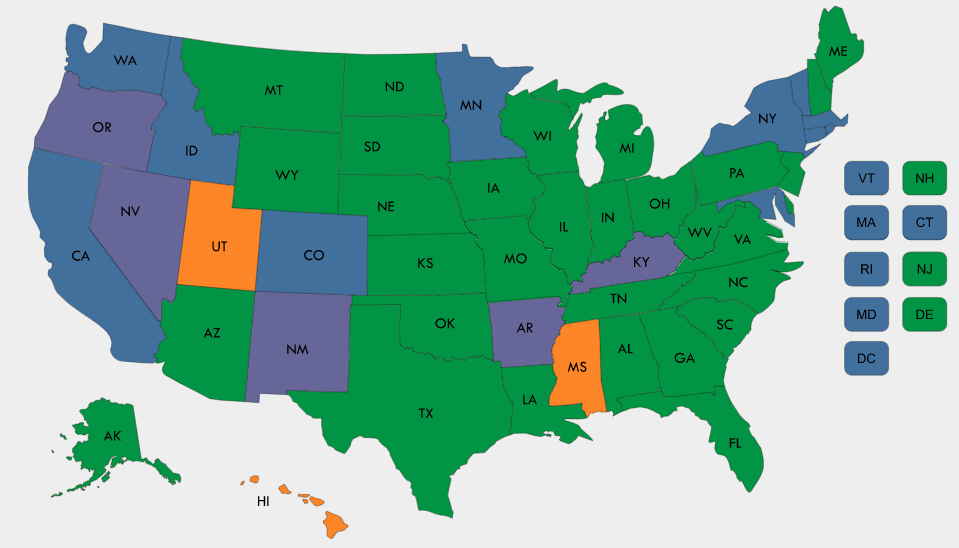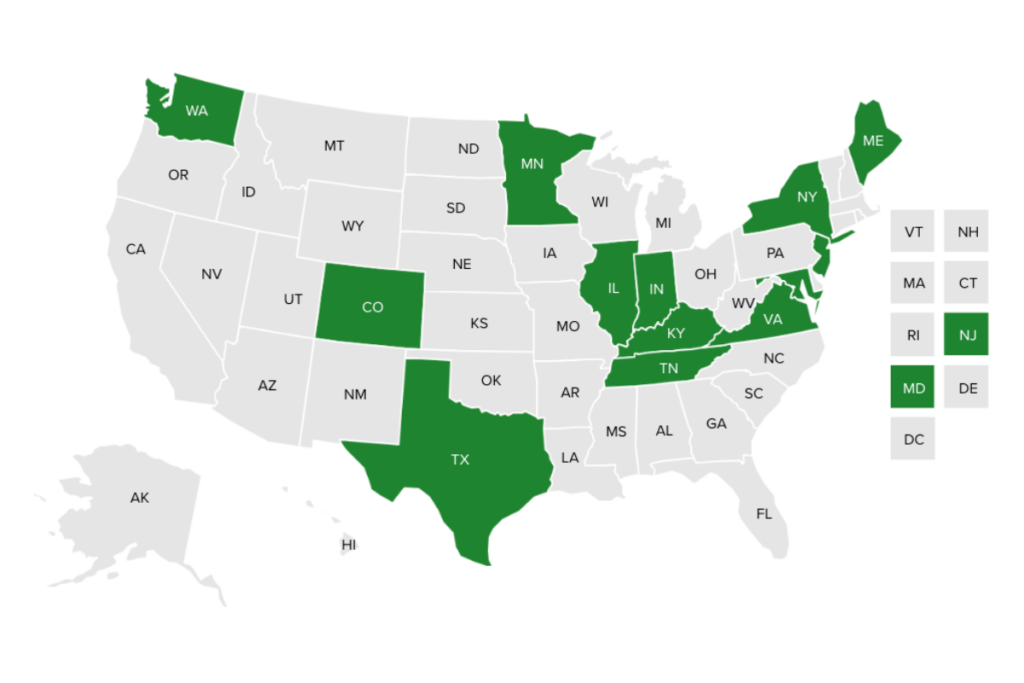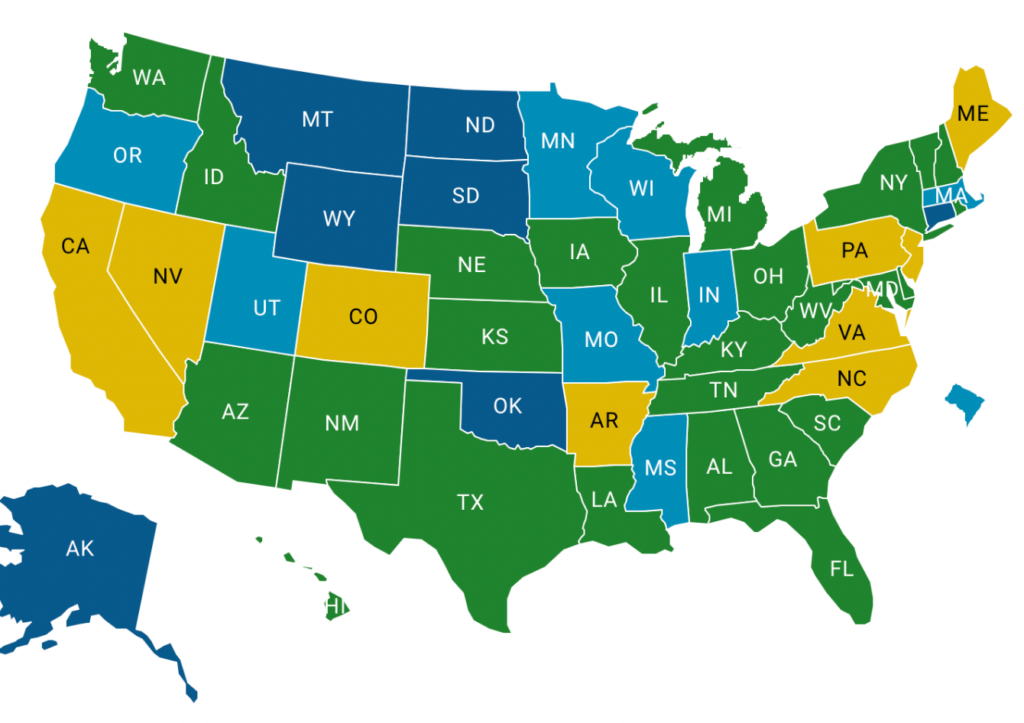This information was collected through a combination of state surveys and NASHP staff research. It offers a snapshot of how the state is defining, training, certifying, and paying for the CHW workforce — as well as how the state is developing cross-agency and state-to-local strategies to improve community health in partnership with CHWs.
This is a dynamic policy space, and states are continuing to develop new approaches. We will continue to make periodic updates to this page. Learn more about state CHW policies across the U.S.
State CHW Definition
The Oregon Health Authority website references the first sentence of the APHA definition of CHWs.
Certification and Training
Certification is encouraged but not required for employment. Only certified CHWs may participate in Health Homes/the Patient-Centered Primary Care Home program. CHWs can apply for certification after completing a state-approved training program. Training centers are certified through the Traditional Health Worker Commission. Core competencies include outreach and mobilization; community liaising; care management, care coordination, and system navigation; and health promotion and coaching. CHWs are trained in lead prevention and asthma trigger reduction.
Medicaid Reimbursement
Oregon’s Medicaid program, the Oregon Health Plan, reimburses for CHW services under the State Plan and requires coordinated care organizations to include traditional health workers, such as CHWs, on their care teams.
CHWs are included as authorized providers for four of the six health home services covered under Oregon’s health home/Patient-Centered Primary Care Homes (PCPCH) State Plan Amendment. CHWs are included for health promotion, comprehensive transitional care, individual and family support services, and referral to community and social supports. CHWs must be certified and supervised by a health professional to qualify for Medicaid reimbursement.
Other Funding or Financing Mechanisms
Information is unavailable.
Key Partnerships
The Oregon Community Health Workers Association is a key partner in supporting the workforce and advancing training and financing infrastructure.
State CHW Legislation
HB 3650 mandated the Oregon Health Authority (OHA) to develop education and training requirements and authorized coordinated care organizations to provide members with access to traditional health workers.
HB 3407 established the Traditional Health Worker Commission, which oversees CHWs, peer support and peer wellness specialists, personal health navigators, and doulas.
HB 2024 requires OHA to adopt rules and procedures for the training and certification of health workers to provide oral disease prevention services.
State Resources
State Overviews
ACO – Accountable care organization
AHEC – Area Health Education Centers
APHA – American Public Health Association
APM – Alternative payment model
CBO – Community-based organization
CDC – Centers for Disease Control and Prevention
CDC CCR Funding – Community Health Workers for COVID Response and Resilient Communities Funding
CHR – Community health representative
CHW – Community health worker
CPT Codes – Current Procedural Terminology Codes
C3 Project – CHW Core Competency Project
FFS – Fee for services
HCSPCS Codes – Healthcare Common Procedure Coding System Codes
HRSA – Health Resources & Services Administration
MCO – Managed care organization
NACHW – National Association of Community Health Workers
SDOH – Social determinants of health
VBP – Value-based payment
State CHW Definition: This category indicates where states have a formal definition of a CHW. In some cases, where there is not a definition in statute, this category may draw information from provider manuals and state websites or reports.
Certification and Training: This category includes information about how CHWs are trained in the state, which entities provide training, whether or not the state runs or recognizes a CHW certification program, and information about the entities that administer existing certification programs.
Medicaid Reimbursement: This category includes information about state Medicaid strategies that provide enrollees access to CHW services. Entries indicate whether state Medicaid programs currently reimburse for CHW services or incorporate CHWs into alternative payment models under the authority of a state plan amendment (SPA), or where states have earmarked funds to support CHW services under the authority of an 1115 demonstration waiver. It also indicates where CHW services might be supported through managed care approaches (e.g., where MCOs are paying for CHW services using administrative dollars or where states are using managed care contracts to incentivize or require MCOs to cover CHW services).
Other Funding or Financing Mechanisms: This category includes information about other state funding or financing approaches that cover CHW services or CHW positions. It includes information about federal grant dollars for which the state is the grantee.
Key Partnerships: This category offers information about key partners outside state government, including state CHW associations and CHW training entities, and highlights formal cross-agency partnerships within the state that support alignment of funding and resources for the CHW workforce.
State CHW Legislation: This category highlights any state legislation relevant to the CHW workforce. This might include statutory language directing agencies to develop a Medicaid reimbursement approach, laws that established state CHW certification, or other relevant statutes.
State Resources: This category offers links to any key reports or resources that states elected to highlight as critical to CHW policy and partnership.



